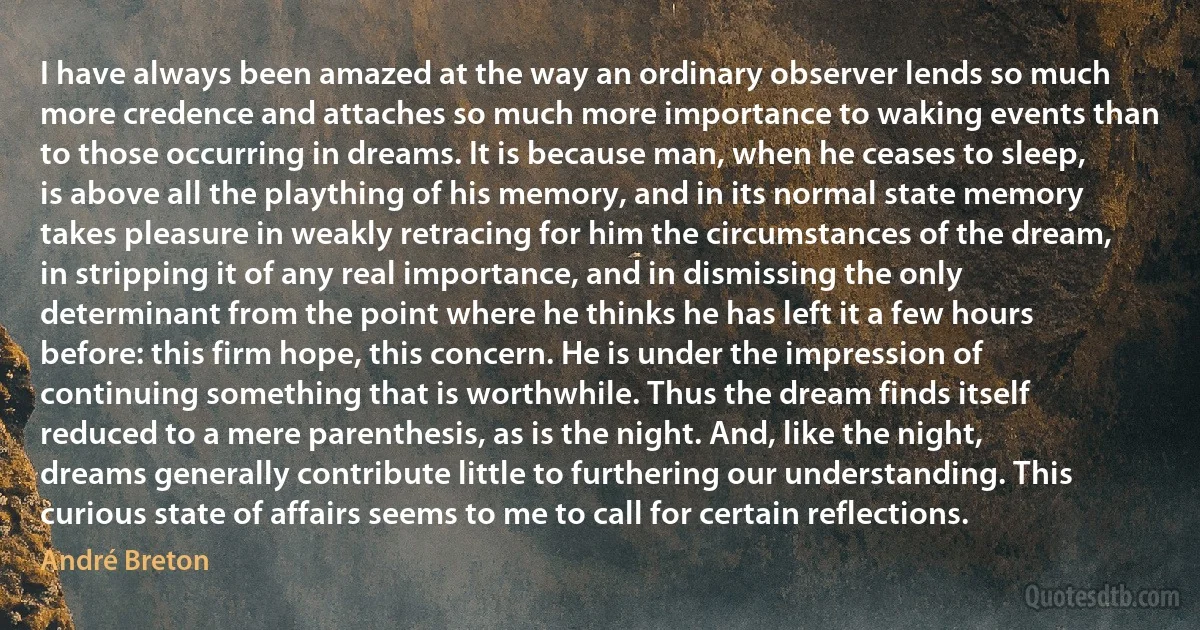
I have always been amazed at the way an ordinary observer lends so much more credence and attaches so much more importance to waking events than to those occurring in dreams. It is because man, when he ceases to sleep, is above all the plaything of his memory, and in its normal state memory takes pleasure in weakly retracing for him the circumstances of the dream, in stripping it of any real importance, and in dismissing the only determinant from the point where he thinks he has left it a few hours before: this firm hope, this concern. He is under the impression of continuing something that is worthwhile. Thus the dream finds itself reduced to a mere parenthesis, as is the night. And, like the night, dreams generally contribute little to furthering our understanding. This curious state of affairs seems to me to call for certain reflections.
André BretonRelated topics
above call certain determinant dream few furthering hope hours left man memory mere night observer occurring parenthesis pleasure point real sleep something state thus under understanding way circumstances affairsRelated quotes
God forbid we should ever be twenty years without such a rebellion. The people cannot be all, and always, well informed. The part which is wrong will be discontented, in proportion to the importance of the facts they misconceive. If they remain quiet under such misconceptions, it is lethargy, the forerunner of death to the public liberty. ... What country before ever existed a century and half without a rebellion? And what country can preserve its liberties if their rulers are not warned from time to time that their people preserve the spirit of resistance? Let them take arms. The remedy is to set them right as to facts, pardon and pacify them. What signify a few lives lost in a century or two? The tree of liberty must be refreshed from time to time with the blood of patriots and tyrants. It is its natural manure.

Thomas Jefferson
The Doctrine of a Perfect God; in whose nature nothing arbitrary or changeable can have a place; in whose Highest Being we all live, and in this Life may, and ought at all times to be, blessed;-this Doctrine, which ignorant men think they have sufficiently demolished when they have proclaimed it to be Mysticism, is by no means Mysticism, for it has an immediate reference to human action, and in deed to the inmost spirit which ought to inspire and guide all our actions. It can only become Mysticism when it is associated with the pretext that the insight into this truth proceeds from a certain inward and mysterious light, which is not accessible to all men, but is only bestowed upon a few favourites chosen from among the rest:-in which pretext the Mysticism consists, for it betrays a presumptuous contemplation of personal merit, and a pride in mere sensuous Individuality.

Johann Gottlieb Fichte
My work is more varied than at any other point in my life. I am still carrying out research in pure mathematics. And I am working on an idea that I had several years ago on negative dimensions. ... Negative dimensions are a way of measuring how empty something is. In mathematics, only one set is called empty. It contains nothing whatsoever. But I argued that some sets are emptier than others in a certain useful way. It is an idea that almost everyone greets with great suspicion, thinking I've gone soft in the brain in my old age. Then I explain it and people realise it is obvious. Now I'm developing the idea fully with a colleague. I have high hopes that once we write it down properly and give a few lectures about it at suitable places that negative dimensions will become standard in mathematics.

Benoît Mandelbrot
THEY who are acquainted with the present state of the theory of Symbolical Algebra, are aware, that the validity of the processes of analysis does not depend upon the interpretation of the symbols which are employed, but solely upon the laws of their combination. Every system of interpretation which does not affect the truth of the relations supposed, is equally admissible, and it is thus that the same process may, under one scheme of interpretation, represent the solution of a question on the properties of numbers, under another, that of a geometrical problem, and under a third, that of a problem of dynamics or optics. This principle is indeed of fundamental importance; and it may with safety be affirmed, that the recent advances of pure analysis have been much assisted by the influence which it has exerted in directing the current of investigation.

George Boole
The chief distinction in the intellectual powers of the two sexes is shewn by man attaining to a higher eminence, in whatever he takes up, than woman can attain - whether requiring deep thought, reason, or imagination, or merely the use of the senses and hands. If two lists were made of the most eminent men and women in poetry, painting, sculpture, music, - comprising composition and performance, history, science, and philosophy, with half-a-dozen names under each subject, the two lists would not bear comparison. We may also infer, from the law of the deviation of averages, so well illustrated by Mr. Galton, in his work on 'Hereditary Genius,' that if men are capable of decided eminence over women in many subjects, the average standard of mental power in man must be above that of woman. ... Thus man has ultimately become superior to woman.

Charles Darwin
